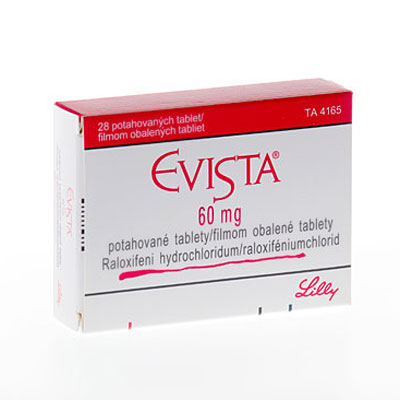Evista (raloxifene) Coupons, Discounts & Cost
Raloxifene is a selective estrogen receptor modulator (agonist of estrogen receptors). One way to save money on the Evista (raloxifene) retail cost regardless of income and insurance status is to use Evista coupons or discount cards from RXCoupons. Use our Raloxifene coupons at your online pharmacy and receive up to 75% off the sale price each time you refill your prescription.
What is Evista (raloxifene)
Raloxifene is a selective estrogen receptor modulator (agonist of estrogen receptors). The drug acts on cholesterol metabolism (reduces total cholesterol and low density lipoprotein (LDL)). Evista is used in postmenopausal women, when the amount of estrogen is reduced. It helps prevent bone resorption, bone loss and reduce the risk of fractures. The drug reduces the frequency of spinal fractures and helps increase bone mineral density (BMD).
Raloxifene reduces the frequency of vertebral fractures in patients taking calcium and vitamin D. Raloxifene leads to a significant reduction in total cholesterol and LDL. In case of long-term use (over 3 years), the drug reduces the level of fibrinogen.
Raloxifene does not increase the incidence of bleeding or endometrial hyperplasia. Long-term use of raloxifene does not increase the risk of endometrial cancer, ovarian cancer, as well as the incidence of endometrial polyps.
Raloxifene has no stimulating effect on the breast (not swelling or breast pain).
Raloxifene reduces the relative risk of new cases of breast cancer in postmenopausal patients.
When to take Evista (raloxifene)
The drug is taken to treat osteoporosis in postmenopausal women (treatment and prevention). It is also used for the prevention of breast cancer in postmenopausal women with osteoporosis.
When to avoid Evista (raloxifene)
Do not use Evista in the following cases: - Hypersensitivity to raloxifene; - Hepatic dysfunction, including cholestasis; - Childbearing age; - Venous thrombosis, including deep vein thrombosis, pulmonary thromboembolism; - Severe renal impairment; - Uterine bleeding of unknown etiology; - Endometrial cancer; - Pregnancy, lactation; - Prolonged immobilization.
Evista should be administered only in postmenopausal women. Women who are able to have children should not take Evista. The drug can lead to fetal disorders when being used in pregnant women. If you become pregnant during the period of administration of the drug, your doctor should tell you about the possible harmful effects on the fetus. It is not recommended to prescribe this drug to women during lactation.
How to take Evista (raloxifene)
The recommended dose is one tablet a day, every day. The drug can be taken at any time of day, regardless of meals. Elderly patients may not change the dose.
Usually women taking Evista should also take calcium and vitamin D supplements.
Evista (raloxifene) side effects
Raloxifene may cause thromboembolism, deep vein thrombosis, pulmonary embolism (more common in the first 6 months of therapy), spasms of the lower limbs, peripheral edema.
Very rare side effects: violation of the gastrointestinal tract (nausea, vomiting, abdominal pain and diarrhea), rash, high blood pressure, headache (including migraine), cholelithiasis.
What drug combinations to avoid with Evista (raloxifene)
Co-administration with warfarin does not affect the pharmacokinetics of the drug. However, there may be a slight reduction in prothrombin time. In this connection, patients should measure the activity of coagulation factors when using raloxifene in combination with warfarin or other coumarin derivatives.
Raloxifene has no effect on the concentration of digoxin.
Non-steroidal anti-inflammatory drugs (paracetamol, acetylsalicylic acid, ibuprofen and naproxen), oral antibiotics, and benzodiazepines have no clinically significant effect on raloxifene.
Raloxifene should not be prescribed with cholestyramine (it significantly reduces the absorption of raloxifene).
The maximum concentration of raloxifene will be reduced when co-administered with ampicillin.
Evista (raloxifene) special instructions
Raloxifene therapy is associated with high risk of venous thrombosis. Therefore, Evista should be discontinued in diseases or conditions associated with prolonged immobility of the patient. Such patients should stop taking the drug as soon as possible.
Raloxifene does not cause endometrial hyperplasia or uterine bleeding. In the event of any uterine bleeding, you need to consult your doctor and determine the cause of bleeding. The most common causes of uterine bleeding are endometrial atrophy and endometrial polyps.
The drug must be administered for the prevention or treatment of osteoporosis only when breast cancer treatment is completed (including adjuvant therapy).
Evista is not effective against hot flushes and other postmenopausal disorders caused by estrogen deficiency.

